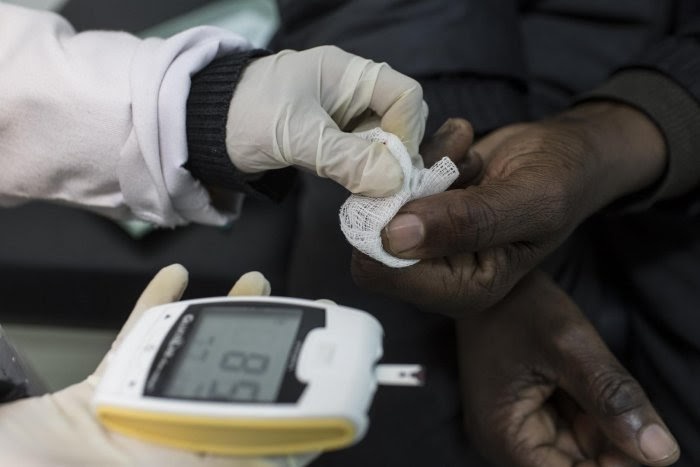#COVID19: Death Rates Higher In Patients With Diabetes
With 24 million people living with diabetes in Africa, the continent is expected to experience the highest increase in diabetes globally.

Africa’s death rates from COVID-19 infections are significantly higher in patients with diabetes, a preliminary analysis presented by the World Health Organisation (WHO) has shown.
The paper was presented on Thursday, Nov. 11, in commemoration of World Diabetes Day.
Ahead of the World Diabetes Day, the International Diabetes Federation estimated 24 million people are living with diabetes in Africa in 2021, and the continent is expected to experience the highest increase in diabetes globally, with the number of Africans suffering from the disease predicted to rise to 55 million by 2045, an increase of 134 per cent compared with 2021.
“Africa is the region with the highest number of people who do not know their diagnosis – an estimated 70 per cent of people with diabetes do not know they have the disease,” the Diabetes federation said.
Dr Matshidiso Moeti, WHO Regional Director for Africa said fighting the diabetes epidemic in Africa is in many ways as critical as the battle against COVID-19.
“The COVID-19 pandemic will eventually subside, but Africa is projected in the coming years to experience the highest increase in diabetes globally. We must act now to vaccinate people who have this condition, identify and support the millions of Africans unaware they are suffering from diabetes.”
The WHO Director said diabetes impairs the body from producing and processing insulin, a substance essential to counteracting a dangerous rise in blood sugar.
He said the disease causes inflammation and poor blood circulation, both of which increase the risk of complications, including death, from COVID-19.
According to him, type 1 diabetes is caused by a condition early in life that damages the pancreas and impairs insulin while type 2 is linked to poor diet obesity and lack of exercise—where the body struggles to process insulin.
According to WHO, about 90 per cent of diabetes cases globally, and the vast majority in Africa, are type 2.
A recent analysis by WHO evaluated data from 13 countries on underlying conditions or comorbidities in Africans who tested positive for COVID-19, the analysis revealed a 10.2 per cent case fatality rate in patients with diabetes, compared with 2.5 per cent for COVID-19 patients overall.
Also, the analysis showed that the case fatality rate for people with diabetes was also twice as high as the fatality rate among patients suffering any comorbidity. In addition to people with diabetes, the three most frequent underlying conditions included patients with HIV and hypertension.
Countries which WHO used for the analysis were Burkina Faso, Chad, Côte d’Ivoire, Democratic Republic of the Congo, Eswatini, Guinea, Namibia, Niger, Rwanda, Senegal, Seychelles, Sao Tome and Principe, and Uganda.
Dr Benido Impouma, Director Communicable and Noncommunicable Diseases Cluster at WHO Regional Office for Africa advised health officials in Africa to take advantage of the growing availability of low-cost rapid diagnostic tests to routinely test patients in diabetes centres to ensure early detection and proper care.
He said the centres can also be key venues for vaccination.
“Since the early days of the pandemic, people with diabetes in countries around the world have been prioritised to receive COVID-19 vaccinations … Africa has faced challenges in this strategy. Access to vaccines in African countries remains poor, only 6.6 per cent of the African population is fully vaccinated against COVID-19, compared with about 40 per cent globally,” Benido said.
The WHO Regional Director said nine months since COVID-19 vaccination campaigns began in Africa, “we are still nowhere near where we need to be with protecting our most vulnerable.”
“All Africans at risk of diabetes must have access to testing,” Dr Moeti said. “We can also stop diabetes from claiming more lives by promoting healthy, affordable diets and regular exercise.”
WHO launched the Global Diabetes Compact in April 2021, to improve equitable access to quality diabetes care. This builds on work in recent years to roll out the WHO Package of Essential Noncommunicable Disease (WHO PEN) interventions for primary health care in low-resource settings.
So far, according to WHO, 21 African countries have started using this package. Benin, Eritrea, Eswatini, Lesotho and Togo have achieved national expansion covering all primary health care facilities.
Support Our Journalism
There are millions of ordinary people affected by conflict in Africa whose stories are missing in the mainstream media. HumAngle is determined to tell those challenging and under-reported stories, hoping that the people impacted by these conflicts will find the safety and security they deserve.
To ensure that we continue to provide public service coverage, we have a small favour to ask you. We want you to be part of our journalistic endeavour by contributing a token to us.
Your donation will further promote a robust, free, and independent media.
Donate HereStay Closer To The Stories That Matter




